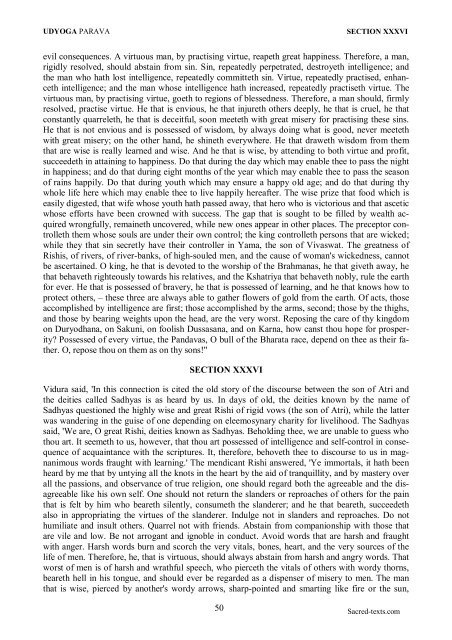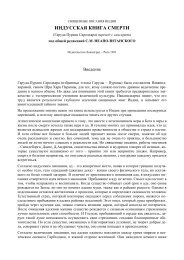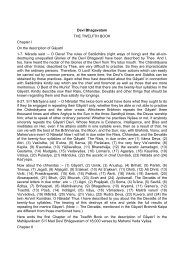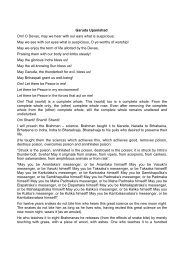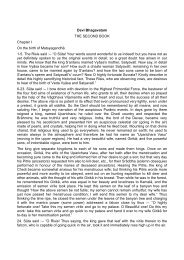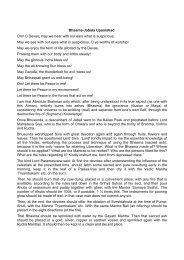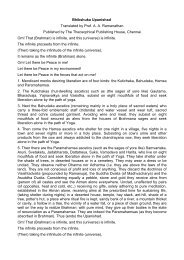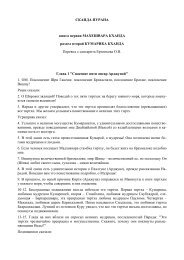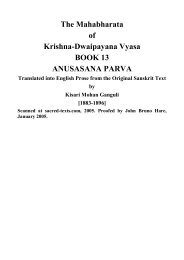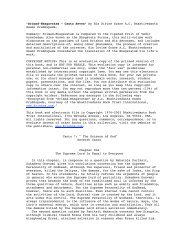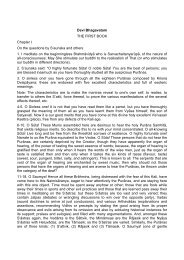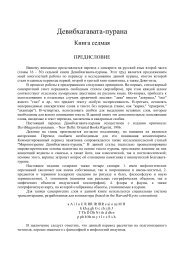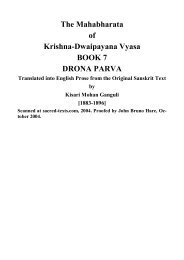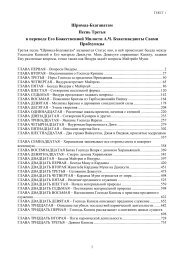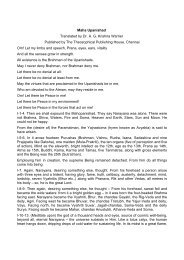Mahabharata 05 (eng)..
Mahabharata 05 (eng)..
Mahabharata 05 (eng)..
Create successful ePaper yourself
Turn your PDF publications into a flip-book with our unique Google optimized e-Paper software.
UDYOGA PARAVA<br />
SECTION XXXVI<br />
evil consequences. A virtuous man, by practising virtue, reapeth great happiness. Therefore, a man,<br />
rigidly resolved, should abstain from sin. Sin, repeatedly perpetrated, destroyeth intelligence; and<br />
the man who hath lost intelligence, repeatedly committeth sin. Virtue, repeatedly practised, enhanceth<br />
intelligence; and the man whose intelligence hath increased, repeatedly practiseth virtue. The<br />
virtuous man, by practising virtue, goeth to regions of blessedness. Therefore, a man should, firmly<br />
resolved, practise virtue. He that is envious, he that injureth others deeply, he that is cruel, he that<br />
constantly quarreleth, he that is deceitful, soon meeteth with great misery for practising these sins.<br />
He that is not envious and is possessed of wisdom, by always doing what is good, never meeteth<br />
with great misery; on the other hand, he shineth everywhere. He that draweth wisdom from them<br />
that are wise is really learned and wise. And he that is wise, by attending to both virtue and profit,<br />
succeedeth in attaining to happiness. Do that during the day which may enable thee to pass the night<br />
in happiness; and do that during eight months of the year which may enable thee to pass the season<br />
of rains happily. Do that during youth which may ensure a happy old age; and do that during thy<br />
whole life here which may enable thee to live happily hereafter. The wise prize that food which is<br />
easily digested, that wife whose youth hath passed away, that hero who is victorious and that ascetic<br />
whose efforts have been crowned with success. The gap that is sought to be filled by wealth acquired<br />
wrongfully, remaineth uncovered, while new ones appear in other places. The preceptor controlleth<br />
them whose souls are under their own control; the king controlleth persons that are wicked;<br />
while they that sin secretly have their controller in Yama, the son of Vivaswat. The greatness of<br />
Rishis, of rivers, of river-banks, of high-souled men, and the cause of woman's wickedness, cannot<br />
be ascertained. O king, he that is devoted to the worship of the Brahmanas, he that giveth away, he<br />
that behaveth righteously towards his relatives, and the Kshatriya that behaveth nobly, rule the earth<br />
for ever. He that is possessed of bravery, he that is possessed of learning, and he that knows how to<br />
protect others, – these three are always able to gather flowers of gold from the earth. Of acts, those<br />
accomplished by intelligence are first; those accomplished by the arms, second; those by the thighs,<br />
and those by bearing weights upon the head, are the very worst. Reposing the care of thy kingdom<br />
on Duryodhana, on Sakuni, on foolish Dussasana, and on Karna, how canst thou hope for prosperity?<br />
Possessed of every virtue, the Pandavas, O bull of the Bharata race, depend on thee as their father.<br />
O, repose thou on them as on thy sons!"<br />
SECTION XXXVI<br />
Vidura said, 'In this connection is cited the old story of the discourse between the son of Atri and<br />
the deities called Sadhyas is as heard by us. In days of old, the deities known by the name of<br />
Sadhyas questioned the highly wise and great Rishi of rigid vows (the son of Atri), while the latter<br />
was wandering in the guise of one depending on eleemosynary charity for livelihood. The Sadhyas<br />
said, 'We are, O great Rishi, deities known as Sadhyas. Beholding thee, we are unable to guess who<br />
thou art. It seemeth to us, however, that thou art possessed of intelligence and self-control in consequence<br />
of acquaintance with the scriptures. It, therefore, behoveth thee to discourse to us in magnanimous<br />
words fraught with learning.' The mendicant Rishi answered, 'Ye immortals, it hath been<br />
heard by me that by untying all the knots in the heart by the aid of tranquillity, and by mastery over<br />
all the passions, and observance of true religion, one should regard both the agreeable and the disagreeable<br />
like his own self. One should not return the slanders or reproaches of others for the pain<br />
that is felt by him who beareth silently, consumeth the slanderer; and he that beareth, succeedeth<br />
also in appropriating the virtues of the slanderer. Indulge not in slanders and reproaches. Do not<br />
humiliate and insult others. Quarrel not with friends. Abstain from companionship with those that<br />
are vile and low. Be not arrogant and ignoble in conduct. Avoid words that are harsh and fraught<br />
with anger. Harsh words burn and scorch the very vitals, bones, heart, and the very sources of the<br />
life of men. Therefore, he, that is virtuous, should always abstain from harsh and angry words. That<br />
worst of men is of harsh and wrathful speech, who pierceth the vitals of others with wordy thorns,<br />
beareth hell in his tongue, and should ever be regarded as a dispenser of misery to men. The man<br />
that is wise, pierced by another's wordy arrows, sharp-pointed and smarting like fire or the sun,<br />
50 Sacred-texts.com


